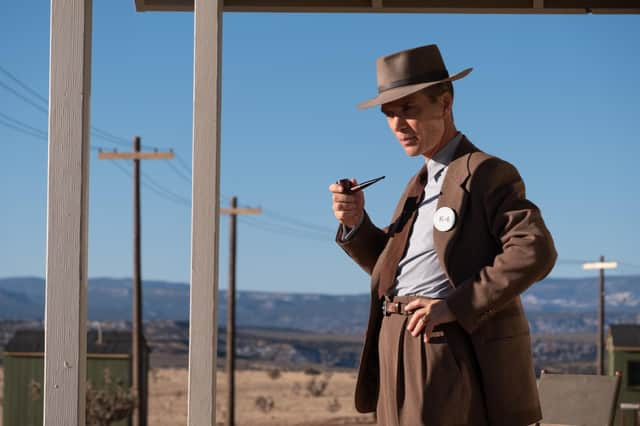Film reviews: Oppenheimer | Barbie


Oppenheimer (15) *****
Barbie (12A) **
Christopher Nolan was never going to make a straightforward biopic of the father of the atomic bomb and so his eponymously titled film about J Robert Oppenheimer proves. Deploying his virtuosic grasp of non-linear storytelling, he transforms Oppenheimer from the dry, talky film it could have been into an urgent, intensely cinematic and thoroughly engrossing apocalyptic thriller. That’s something he didn’t quite pull off with his sci-fi palindrome Tenet, though the two make interesting companion pieces, not least because Tenet specifically referenced Oppenheimer as part of its outré plot exploring whether or not it’s possible to unmake a catastrophic mistake. That theme is really the key to understanding Oppenheimer, played here by Nolan regular Cillian Murphy, whose gaunt frame and sunken cheeks give him the haunted look of someone who has definitely “known sin.”
The film sets him up as Promethean figure, a flawed genius who harnessed the destructive power of the universe, only to be tormented by his choices and persecuted for his work by the very government who put him in charge of the Manhattan Project. Nolan teases this out by jumping back and forth in the timeline of Oppenheimer’s life, though the underlying structure itself is fairly simple, with the first half charting the race against time to create and test the first atomic bomb and the second half delving more deeply into the fallout from that operation. The narrative through-line is really Oppenheimer’s gradual realisation that the war he signed on to fight against the Nazis is actually being transformed by his government into a covert war against the Soviet Union, an ideological shift that makes his earlier career as a free-thinking academic with left-leaning politics more problematic.
Advertisement
Hide AdAmong the heavyweight supporting cast, there are meaty performances from Matt Damon as Oppenheimer’s Pentagon superior Leslie Groves and Emily Blunt as Oppenheimer’s frequently soused, but formidable, second wife Kitty. There’s also a slippery role for Robert Downey Jr as Lewis Strauss, the one-time chair of the Atomic Energy Committee whose story Nolan uses as an additional framing device. Then there’s Florence Pugh, electrifying as Oppenheimer’s first wife Jean Tatlock, though quite what we’re supposed to make of her sex scene – in which Oppenheimer translates the Sanskrit text of the Hindu scripture, the Bhagavad Gita, for her mid-coitus – is anyone’s guess. “Now I am become Death, the destroyer of worlds,” he announces as Jean climaxes. All that’s missing is a crude cutaway to a mushroom cloud.
Speaking of which, the testing of the bomb provides the film with its midpoint money shot and it’s among the best things Nolan has done, an immersive, unbearably tense set-piece that makes innovative use of silence to help convey the awesome power of what they’ve unleashed. It’s followed by an even better scene in which the consequences of what Oppenheimer has accomplished registers in his mind in the middle of a victory speech to his colleagues. Jubilation quickly turns to judgment as the carnage the A-Bomb will soon inflict on Hiroshima and Nagasaki bleeds from the future into the present via hallucinatory images of flaying skin, charcoal remains and the ash of incinerated bodies. Some mistakes can’t be unmade.
“Now I am become Barbie, the destroyer of worlds”, could be the jokey Oppenheimer-esque tagline to Barbie, Greta Gerwig’s much-hyped film about the pop-culture-conquering doll whose weird history as a frenemy of feminism provides what little substance there is to this DayGlo disappointment. Less a movie than a collection of meme-able moments, its much-hoped-for subversion amounts to few gentle digs at the film’s corporate paymasters folded into a derivative story in which “Stereotypical Barbie” (played by Margot Robbie) undergoes an existential awakening that forces her to leave Barbieland and enter the real world. There she’s soon horrified to discover that women aren’t in charge and all the positive and inspiring messages she thought Barbies were providing little girls have instead had a detrimental effect.


Though initially this suggests the film is going to have some bite, Gerwig and co-writer Noah Baumbach don’t really follow through. Abandoning the internal logic of a promising premise that ties the interior life of Barbie to the way she’s played with in the real world, they fall back instead on heavily ironic fish-out-of-water gags and insider jokes about cancelled toy-lines and absent genitalia, all the while inuring the film against criticism with lots of wink-wink meta-commentary designed to make people who don’t fall in line with the film’s blanket marketing campaign feel like spoilsports.
Part of the frustration, though, comes from the fact that its high concept ideas have already been done to death in the likes of The Lego Movie, Enchanted, The Truman Show and even last year’s underrated Don’t Worry Darling, to which this film often feels like a perky flip-side, especially when poor dimwit Ken (Ryan Gosling) discovers something called “patriarchy” and, through sheer dumb luck, manages to remake Barbieland in his own image. Barbie may be scratching at something interesting in satirising the easy ride mediocre men have in the world, but it’s also one of the bigger ironies that it only really comes alive as a movie when Ken gains some agency and Gosling is allowed to cut loose. He gets the lion’s share of the laughs – though at the packed screening I attended even these were intermittent and forced. As for Robbie, while perfectly cast, it’s just a shame her character arc is so insipid, filled as it is with feminist-sounding platitudes and, at one point, a plea for an ordinary Barbie, something this film, sadly, has no trouble delivering.
Oppenheimer and Barbie are on general release from 21 July